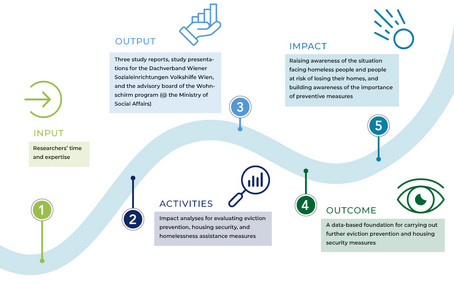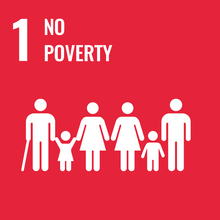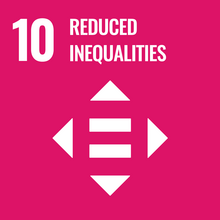Preventing evictions pays off
Why every euro spent on eviction prevention creates strong social returns on investment
When people lose their home, many of those affected by eviction find themselves on the brink of a social downward spiral. Without a place to live, they face the combined risks of poverty, health problems, and isolation. But what if there was a way to prevent evictions? And what if it not only helped those affected, but also benefited society?
@@script:$(".md-cnt-slider-nav").hide();
The WU Competence Center for Nonprofit Organizations has carried out several studies to examine the impact of eviction prevention measures. One of the studies was based on a social return on investment (SROI) analysis. The goal? Finding out if eviction prevention efforts pay off. To do this, the researchers collected data, ran scenarios, and held numerous interviews. The key question was: Are measures for preventing evictions worth the cost? The answer came quickly, and it was very clear: Every euro invested in measures for preventing evictions generates €94 of social added value.
One of the examples that illustrate this added value is the Fachstelle für Wohnungssicherung (FAWOS) eviction prevention services center, run by the Volkshilfe Wien welfare organization. This program saves money, because it helps people to hang on to their homes, so the government doesn’t have to shoulder the substantial follow-up costs of evictions, such as expenses for emergency housing and social assistance services. But the benefits don’t stop there. People can keep their place of residence, which means the center of their life routines remains intact, and children don’t have to change to a different kindergarten or school.
This also proved to be extremely important during the COVID-19 crisis, when many people lost part of their income and were at risk of losing their homes as well. Subsidized programs such as the Austrian Ministry of Social Affairs’ Wohnschirm initiative helped prevent the worst. This program supports people who have fallen behind on their rent payments as a result of the COVID-19 crisis or the recent cost-of-living crisis. It was set up in close collaboration with social support organizations and focuses on preventing evictions. The results so far clearly show that the program has been successful in helping many people hang on to their homes and stabilize their financial situation with lasting effects.
The studies carried out at WU provide scientific evidence that confirms the value of eviction prevention programs like these. Based on solid data, the researchers were able to quantify how valuable secure housing is in enabling social participation and reducing follow-up costs. This has changed the way social assistance programs are perceived, by showing that eviction prevention not only makes humanitarian sense, it also makes economic sense.
Key Facts
The Competence Center for Nonprofit Organizations and Social Entrepreneurship has carried out three studies to investigate the impact of institutions and programs providing eviction prevention, housing security, and homelessness assistance services:
Impact analysis for the City of Vienna’s homelessness assistance program, September 2019–October 2020
Study on the social and economic added value of the eviction prevention activities of the Fachstelle für Wohnungssicherung Wien (FAWOS), based on an SROI analysis, June 2019–June 2024
Continuous evaluation of the COVID-19-related eviction prevention and housing security activities carried out as part of the Wohnschirm program, June 2022–October 2024
WU staff involved: Christian Grünhaus, Katharina Wankat, Eva More-Hollerweger, Anahita Parsian, former WU staff involved: Constanze Grünhaus (née Beeck), Flavia-Elvira Enengl (née Bogorin), Jana Pfrendl, Bettina Weitzhofer
Research commissioned by: Dachverband Wiener Sozialeinrichtungen (1), Fachstelle für Wohnungssicherung Wien (FAWOS) (2), Federal Ministry for Social Affairs, Health, Care and Consumer Protection (BMSGPK) (3)





